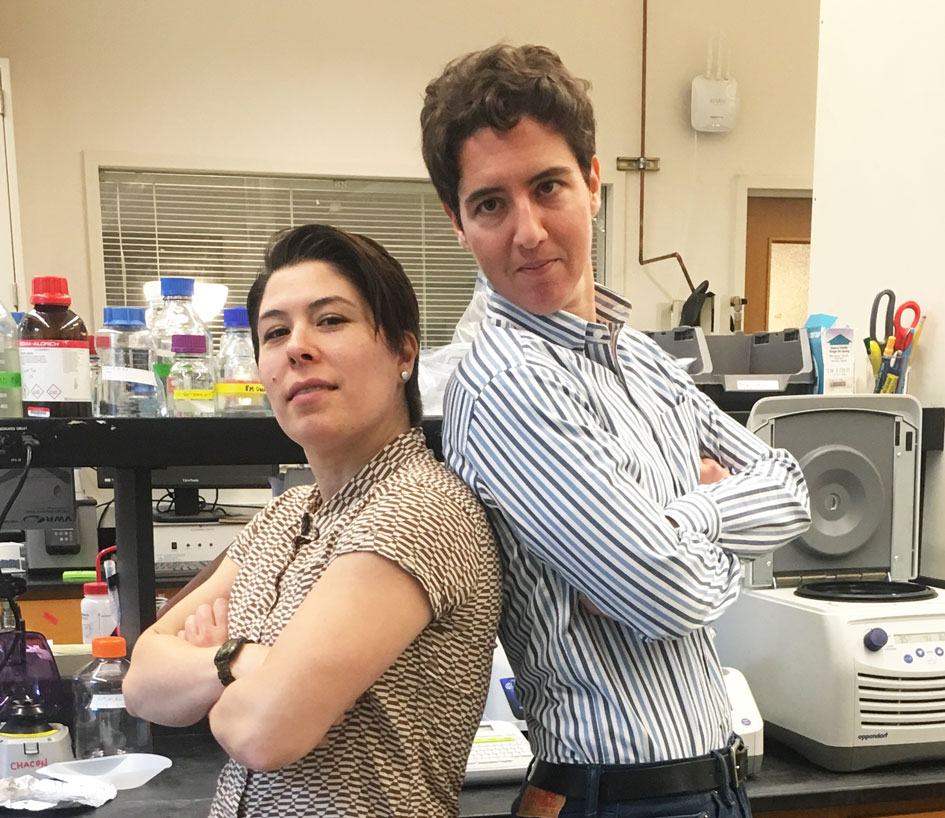Unlocking Atomic Secrets
Chemistry profs tackle copper ions and proton tunneling in semester’s last lecture.
Copper ions may hold the secret to fighting the scourge of antibiotic-resistant bacteria. Teleporting protons could be the key to finding greener fuels and reducing CO2 emissions.
These were two of the key takeaways from a special end-of-semester Chemistry 101 lecture given by assistant professors Miriam Bowring and Kelly Chacón. On a bright, crisp December morning, the doors to Vollum Lecture Hall were open to the Reed community to hear about Bowring and Chacón’s research.
Prof. Chacón’s presentation, titled “Decoding super-secret handshakes of metalloproteins,” outlined her investigation into the biochemical tools that bacteria use to fight back against copper, which is both an essential nutrient and a microbial toxin. The research—which earned Chacón a sizeable grant in 2016—focuses on how copper ions are trafficked in the cell, using a state-of-the-art spectroscopy method called rapid-freeze quench XAS. Last month she and several Reed students published a paper on this phenomenon in Nature Communications Biology. She and her collaborator Ninian Blackburn hope that the research will open new doors to understanding and combating antibiotic-resistant bacteria.
Prof. Bowring’s presentation, titled “Protons, Palladium, and Purple,” focused on her work on chemical catalysts. Her research group studies proton tunneling—an incredible phenomenon where protons appear to “teleport,” allowing chemical reactions to occur that would otherwise seem impossible. Bowring’s quest to develop catalysts that use tunneling could have far-reaching effects on the production and storage of environmentally-friendly fuels, and is supported by a grant from the Murdock Trust. Earlier this year she published a paper about proton tunneling in the Journal of the American Chemical Society, with coauthors from Yale and the University of Washington. Prof. Bowring also described her group’s work on repurposing polluted dirt as a catalyst.
Both professors spoke about the contributions of current and former thesis students, giving attendees an idea of how Reed undergraduates contribute to cutting-edge scientific research.
Biology major Kevin Yang ’22 appreciated the way the professors used concepts introduced earlier in the semester to shed light on their research—even if the content was more advanced. “The lecture was more difficult than previous ones, but both professors made the concepts accessible,” he said.
Both professors are passionate about making chemistry accessible to people without technical knowledge. “Making scientific discoveries is meaningless if our friends and neighbors can't understand or benefit from our work,” says Prof. Bowring.
“Our Chemistry 101 students come to us with a wide variety of backgrounds and majors, which is something Miriam and I really value about the course,” says Prof. Chacón. “As a person who didn’t really know anything about chemistry until I was in my mid-twenties, I am grateful for those who brought me into the fold! So on principle I love to translate—and not necessarily simplify—my research for my colleagues, students and the public.”
The special lecture gave broader context to the principles Chem 101 students have been learning, and showed how the equations and graphs fit into the big picture.
Tags: Academics, Campus Life, Professors, Research
